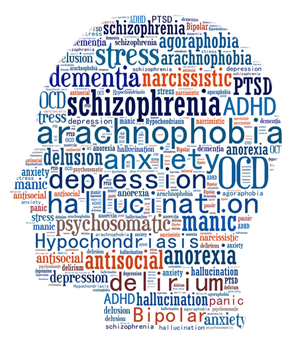PSYCHOLOGY OF MENTAL HEALTH
Psychology 408- Offered Spring, 2017 with Dr. Shannon Lupien
 The Psychology of Mental Illness (sometimes referred to as "Abnormal Psychology") introduces students to the assumed causes, course, and available treatments for various forms of mental illness. In my course, I want to encourage students to view "deviant" or aberrant behaviors as nonetheless human behaviors, deserving of consideration and respect.
The Psychology of Mental Illness (sometimes referred to as "Abnormal Psychology") introduces students to the assumed causes, course, and available treatments for various forms of mental illness. In my course, I want to encourage students to view "deviant" or aberrant behaviors as nonetheless human behaviors, deserving of consideration and respect.
One of the main goals of this course is to help students to better understand illnesses which are causing suffering and discomfort (physical & psychological) in human beings, and interfering with their ability to cultivate productive and/or satisfying lives. We will focus not only on description/diagnostic symptoms of various behaviors/disorders, but also on proposed etiologies (causes) and treatments, as well as on differing theoretical conceptualizations about causes, diagnosis, and treatment. Also, throughout the course I will continually encourage you (through readings and class discussions) to critically analyze the “scientist-practitioner” model that the clinical field currently follows.
There is much controversy in the field with regard to subjecting clinical methods and treatments to scientific scrutiny – and it is important to understand how these issues impact the quality of treatment ultimately delivered in the applied domain. This course will take an eclectic, multicultural approach to mental illness, drawing on important contributions from various disciplines and theories. Cross-cultural evidence and input will always be discussed where appropriate. Social issues, legal issues, and ethical issues will also be considered. This course will generally be limited to discussion of adult disorders (with occasional exceptions), as well as adulthood disorders that originate earlier in development (e.g., OCD). In addition to teaching students the causes, symptoms, and treatments for mental disorders, I will alert them to the stereotypes, myths, and stigma applied to individuals who suffer from the disorders we discuss.
